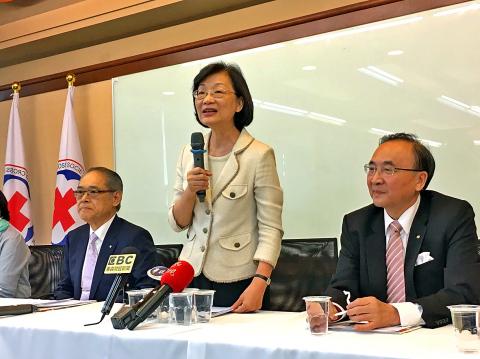The first policy negotiations between the Executive Yuan and the Legislative Yuan on Monday night resulted in a decision to abolish the Red Cross Society Act of the Republic of China (中華民國紅十字會法), the Executive Yuan said.
The New Power Party (NPP) and the Democratic Progressive Party (DPP) in February proposed abolishing the act, saying that the society had special legal status and was not subject to the Civil Associations Act (人民團體法) and the Charity Donations Act (公益勸募條例), adding that the abolishment of the act would advance the implementation of “transitional justice.”
While the NPP on May 3 moved to have the abolishment measure sent directly to a second reading, bypassing all discussion in committees, the Chinese Nationalist Party (KMT) objected, resulting in yesterday’s cross-caucus negotiation.

Photo: Yang Mien-chieh, Taipei Times
However, the negotiations failed to reach a consensus, with the legislature to vote on the annulment of the act in early July at the latest, according to legislative procedures.
In response to protests from the Red Cross Society since the annulment was first proposed, Executive Yuan spokesperson Tung Chen-yuan (童振源) said the society misunderstood the decision.
“The society’s establishment has its historical background and necessity, and we do not doubt it has contributed positively to the nation and to the public, but there also exist certain flaws in how the society functions, including the use of its charity funds and the election of its chairperson,” Tung said.
Negotiations saw the Executive Yuan’s support for the legislature’s motion to abolish the act so the society becomes more transparent and healthy in its organization, thus being of greater benefit to the public, Tung said.
Once the abolishment measure is passed, the central government would no longer have to assign an official to sit on the society’s board, Tung said, adding that the organization would be regulated in accordance with the Civil Associations Act.
As for the groups’s fundraising drives, Tung said that if the abolishment motion is ratified, the society’s fundraising would have to follow regulations according to the Charity Donations Act.
Society chairperson Wang Ching-feng (王清峰) said that the perceived flaws in how the group functions should have been rectified via investigation or legal action rather than by abolishing the act, adding that the decision has impinged on the reputation of a humanitarian organization.
Additional reporting by Yang Mien-chieh

ENDEAVOR MANTA: The ship is programmed to automatically return to its designated home port and would self-destruct if seized by another party The Endeavor Manta, Taiwan’s first military-specification uncrewed surface vehicle (USV) tailor-made to operate in the Taiwan Strait in a bid to bolster the nation’s asymmetric combat capabilities made its first appearance at Kaohsiung’s Singda Harbor yesterday. Taking inspiration from Ukraine’s navy, which is using USVs to force Russia’s Black Sea fleet to take shelter within its own ports, CSBC Taiwan (台灣國際造船) established a research and development unit on USVs last year, CSBC chairman Huang Cheng-hung (黃正弘) said. With the exception of the satellite guidance system and the outboard motors — which were purchased from foreign companies that were not affiliated with Chinese-funded

PERMIT REVOKED: The influencer at a news conference said the National Immigration Agency was infringing on human rights and persecuting Chinese spouses Chinese influencer “Yaya in Taiwan” (亞亞在台灣) yesterday evening voluntarily left Taiwan, despite saying yesterday morning that she had “no intention” of leaving after her residence permit was revoked over her comments on Taiwan being “unified” with China by military force. The Ministry of the Interior yesterday had said that it could forcibly deport the influencer at midnight, but was considering taking a more flexible approach and beginning procedures this morning. The influencer, whose given name is Liu Zhenya (劉振亞), departed on a 8:45pm flight from Taipei International Airport (Songshan airport) to Fuzhou, China. Liu held a news conference at the airport at 7pm,

Taiwan was ranked the fourth-safest country in the world with a score of 82.9, trailing only Andorra, the United Arab Emirates and Qatar in Numbeo’s Safety Index by Country report. Taiwan’s score improved by 0.1 points compared with last year’s mid-year report, which had Taiwan fourth with a score of 82.8. However, both scores were lower than in last year’s first review, when Taiwan scored 83.3, and are a long way from when Taiwan was named the second-safest country in the world in 2021, scoring 84.8. Taiwan ranked higher than Singapore in ninth with a score of 77.4 and Japan in 10th with

Authorities yesterday elaborated on the rules governing Employment Gold Cards after a US cardholder was barred from entering Taiwan for six years after working without a permit during a 2023 visit. American YouTuber LeLe Farley was barred after already being approved for an Employment Gold Card, he said in a video published on his channel on Saturday. Farley, who has more than 420,000 subscribers on his YouTube channel, was approved for his Gold Card last month, but was told at a check-in counter at the Los Angeles International Airport that he could not enter Taiwan. That was because he previously participated in two